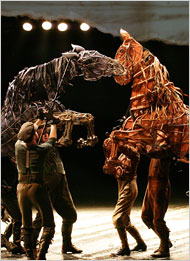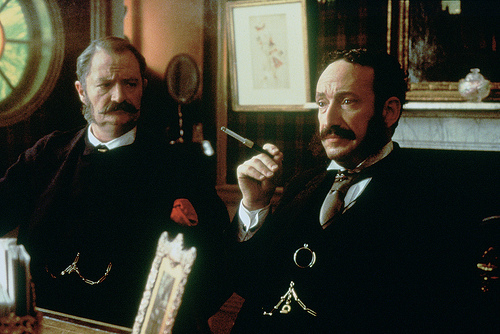The Bill Evans Trio plays “Spring Is Here”:
Archives for 2011
TT: Almanac
“You’re only as good as your last compliment.”
Chelsea G. Summers (posted on Twitter, Apr. 4, 2011)
TT: The fine art of tearjerking
Once again, I’m climbing out on a limb and panning–kind of, sort of–what I suspect is going to be the popular favorite of the current Broadway season, Lincoln Center Theater’s transfer of the London production of War Horse. Here’s an excerpt.
* * *
 “War Horse” was a big hit in London, and it will be a big hit at New York’s Lincoln Center Theater. It can’t fail, and it shouldn’t. Never again will you see such visually poetic, technically self-assured craftsmanship as is on near-continuous display in this large-cast stage version of Michael Morpurgo’s 1982 children’s novel about the adventures of a horse called Joey–played onstage by a life-sized puppet–who is sold to the British cavalry in 1914 and shipped to France, where he is ridden into battle and lost behind enemy lines. Anyone who fails to respond to “War Horse” on the level of pure spectacle simply doesn’t like theater.
“War Horse” was a big hit in London, and it will be a big hit at New York’s Lincoln Center Theater. It can’t fail, and it shouldn’t. Never again will you see such visually poetic, technically self-assured craftsmanship as is on near-continuous display in this large-cast stage version of Michael Morpurgo’s 1982 children’s novel about the adventures of a horse called Joey–played onstage by a life-sized puppet–who is sold to the British cavalry in 1914 and shipped to France, where he is ridden into battle and lost behind enemy lines. Anyone who fails to respond to “War Horse” on the level of pure spectacle simply doesn’t like theater.
Unfortunately, there’s a catch, and it, too, is big: “War Horse” is the most shameless piece of tearjerking to hit Broadway since “The Sound of Music.” If that doesn’t stop you in your tracks, buy your tickets now. Otherwise, read on and be forewarned.
The synopsis of “War Horse” with which this review began is all you need to know about the events of the play, which is a straight-off-the-rack pageant of sibling rivalry, youthful rebellion, crazy courage and folk songs. Since critical etiquette forbids the revelation of surprises, even when they’re not surprising, suffice it to say that what happens thereafter is a cross between “Black Beauty” and “Saving Private Ryan.” Small wonder that Steven Spielberg is turning “War Horse” into a movie–only without the puppetry. That, however, will be like performing “La Bohème” without the music, since the puppetry is the point of the show. All of the animals in “War Horse” are “played” by puppets whose operators are visible to the audience, and it is this deliberate renunciation of conventional theatrical illusion that enables the poetry. You know that Joey and his fellow horses are mechanical dummies, but they are manipulated with such uncanny sensitivity that words like “realism” and “naturalism” quickly fade into irrelevance….
So…what’s not to like? The fundamental flaw of “War Horse” is that Nick Stafford, who wrote the script “in association” (that’s how the credit reads) with South Africa’s Handspring Puppet Company, has taken a book that was written for children and tried to give it the expressive weight of a play for adults. Not surprisingly, Mr. Morpurgo’s plot can’t stand the strain. Dramatic situations that work perfectly well in the context of the book play like Hollywood clichés onstage….
* * *
Read the whole thing here.
TT: The case of the disappearing duo
 The Criterion Collection has just put out superbly produced home-video versions of Topsy-Turvy, Mike Leigh’s wonderful 1999 movie about the making of The Mikado, and Victor Schertzinger’s fascinating 1939 film version of The Mikado as performed by members of the D’Oyly Carte Opera Company, for whom the operetta was originally written in 1885. These releases are the subject of my “Sightings” column in today’s Wall Street Journal. Here’s an excerpt.
The Criterion Collection has just put out superbly produced home-video versions of Topsy-Turvy, Mike Leigh’s wonderful 1999 movie about the making of The Mikado, and Victor Schertzinger’s fascinating 1939 film version of The Mikado as performed by members of the D’Oyly Carte Opera Company, for whom the operetta was originally written in 1885. These releases are the subject of my “Sightings” column in today’s Wall Street Journal. Here’s an excerpt.
* * *
Why are the comic operettas of W.S. Gilbert and Arthur Sullivan so rarely seen in fully professional productions nowadays? “H.M.S. Pinafore,” “The Gondoliers,” “The Mikado” and “The Pirates of Penzance” are immortal masterpieces whose musicality and stageworthiness have been proven time and again. Opera companies mount them from time to time, most recently when Chicago’s Lyric Opera gave the deluxe treatment to “The Mikado” in December. Yet their popularity has diminished sharply in this country, so much so that I’ve had only one occasion to review a Gilbert and Sullivan revival by an important American theater company, when the Utah Shakespearean Festival did “Pinafore” in 2006.
I can’t tell you why G & S (as they’re known to their fans) have fallen on such hard times, but I’m delighted to report that you can now relish them in your living room….
“Topsy-Turvy” is the smartest backstage movie ever made, a deeply knowing fictional study of how a theatrical production takes shape. The acting, especially that of Jim Broadbent as the irascible, anxiety-ridden Gilbert, is as convincing as it is possible to be….
The 1939 film version of “The Mikado” is noteworthy in part because it, too, is so well sung and played. (The conductor, Geoffrey Toye, had extensive experience performing the G & S operettas in the theater.) But the most remarkable thing about the film is that it preserves a now-dead theatrical tradition. The D’Oyly Carte Opera Company, which closed its doors in 1982 after a century of continuous activity, prided itself on performing the operettas of Gilbert and Sullivan in a manner consistent with the intentions of Gilbert himself, who staged all of their premieres. Though the “Mikado” film is not a literal record of a stage performance, much of it is closely based on the way that the company had been doing “The Mikado” ever since it opened more than a half-century earlier….
* * *
Read the whole thing here.
“Three Little Maids from School Are We,” as performed in the 1939 film of The Mikado:
TT: Almanac
“When I’m in a room where nobody knows me I know I’m in the real world.”
Virgil Thomson (quoted in Anthony Tommasini, Virgil Thomson: Composer on the Aisle)
TT: So you want to see a show?
Here’s my list of recommended Broadway, off-Broadway, and out-of-town shows, updated weekly. In all cases, I gave these shows favorable reviews (if sometimes qualifiedly so) in The Wall Street Journal when they opened. For more information, click on the title.
BROADWAY:
• Anything Goes (musical, G/PG-13, mildly adult subject matter that will be unintelligible to children, closes Jan. 8, reviewed here)
• How to Succeed in Business Without Really Trying (musical, G/PG-13, perfectly fine for children whose parents aren’t actively prudish, reviewed here)
• The Importance of Being Earnest (high comedy, G, just possible for very smart children, closes July 3, reviewed here)
• Lombardi (drama, G/PG-13, a modest amount of adult subject matter, reviewed here)
• Million Dollar Quartet (jukebox musical, G, reviewed here)
• The Motherf**ker with the Hat (serious comedy, R, adult subject matter, closes June 26, reviewed here)
OFF BROADWAY:
• Avenue Q (musical, R, adult subject matter and one show-stopping scene of puppet-on-puppet sex, reviewed here)
• The Fantasticks (musical, G, suitable for children capable of enjoying a love story, reviewed here)
• Play Dead (theatrical spook show, PG-13, utterly unsuitable for easily frightened children or adults, reviewed here)
IN LOS ANGELES:
• God of Carnage (serious comedy, PG-13, Los Angeles remounting of Broadway production with original cast, adult subject matter, closes May 15, Broadway run reviewed here)
CLOSING SOON ON BROADWAY:
• La Cage aux Folles (musical, PG-13, adult subject matter, closes May 1, reviewed here)
CLOSING NEXT WEEK OFF BROADWAY:
• Angels in America (drama, PG-13/R, adult subject matter, closes Apr. 24, reviewed here)
TT: Almanac
“Nouns are names and can be libelous; the verbs, though sometimes picturesque, are few in number and tend toward alleging motivations. It is the specific adjectives that really describe and that do so neither in sorrow nor in anger. And to describe what one has heard is the whole art of reviewing.”
Virgil Thomson, Virgil Thomson
DVD
Support Your Local Sheriff. A wide-gauge western spoof written and directed by William Bowers and Burt Kennedy, who between them made more than their share of dead-serious horse operas. All but forgotten today, Support Your Local Sheriff was one of the sleeper hits of 1969, partly because of the irresistible charm of James Garner as the Maverick-like sort-of-anti-hero and partly because of the perfect supporting cast (Walter Brennan, Bruce Dern, Joan Hackett, Harry Morgan). And guess what? It’s as funny today as it was when I saw it in the theater as a boy (TT).
